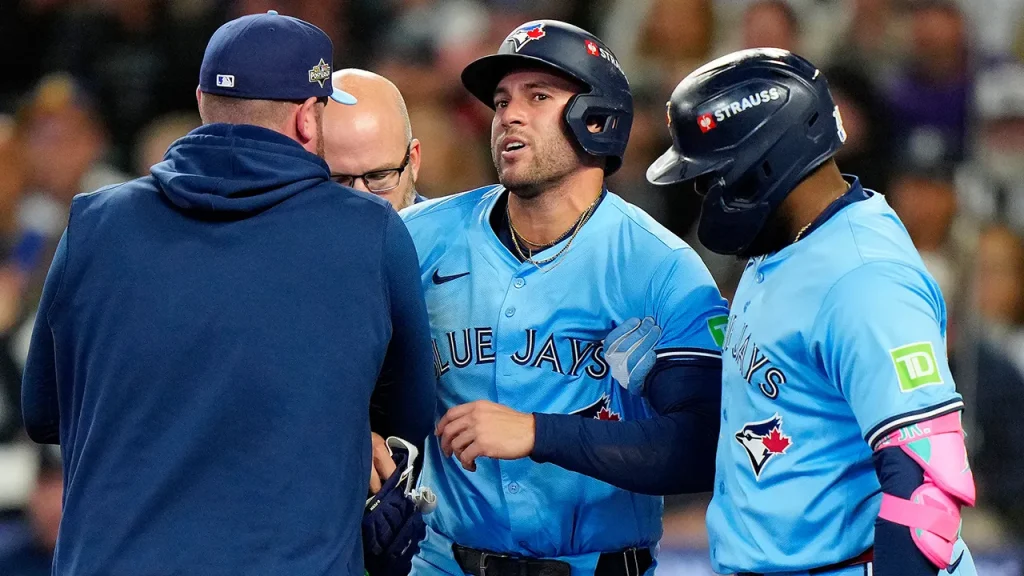Blue Jays Manager Slams Mariners Fans for Unsportsmanlike Behavior
In a heated post-game press conference, Toronto Blue Jays manager John Schneider didn’t mince words when addressing what he perceived as a serious breach of sportsmanship from Seattle Mariners fans. Following Game 4 of the American League Championship Series, which pushed the Blue Jays to the brink of elimination with a 3-1 series deficit, Schneider expressed his disappointment with the crowd’s reaction to an injury suffered by star outfielder George Springer. The four-time All-Star was struck on the right kneecap by a pitch from Mariners right-hander Bryan Woo in the seventh inning, sending him to the ground in obvious pain. As medical staff attended to Springer and helped him limp off the field, the Seattle crowd’s response — loud booing — left the Blue Jays’ dugout stunned and angered. “I know this is an awesome atmosphere to play in,” Schneider acknowledged, recognizing the electric playoff environment at T-Mobile Park. “And it’s really, really cool to play here, and I think the fans that were booing him should take a look in the mirror and understand what kind of player he is.” The manager continued with evident frustration: “When a guy gets hit in the knee and is in obvious pain and you have 40,000 people cheering, not the right thing to do.”
This incident highlights the sometimes blurry line between passionate fandom and basic human decency in sports. Third baseman Ernie Clement echoed his manager’s sentiments, calling the crowd’s reaction “classless” while noting that his personal interactions with Mariners fans throughout the series had otherwise been positive. “I don’t know how you boo somebody who’s down on the ground hurt,” Clement said, clearly struggling to understand the hostility directed at his injured teammate. “I don’t understand that. I’ve had a lot of respect for all of the Mariners fans, especially the ones that I’ve kind of talked to throughout the series, they’ve been awesome. But that’s a tough moment.” The reaction from the Seattle crowd stands in stark contrast to what most consider proper etiquette at sporting events, where injuries to opposing players typically receive respectful silence or even supportive applause when they’re able to leave the field.
The injury to Springer came at a particularly crucial moment both in the game and series. The Blue Jays had been clinging to a 2-1 lead when the incident occurred, hoping to extend the series and avoid elimination. Springer has been a vital component of Toronto’s postseason push, hitting .256 with three home runs and five doubles this October. The 36-year-old veteran had been on a remarkable streak, with his run-scoring double in the fifth inning marking his sixth consecutive game with an extra-base hit. His performance has been central to the Blue Jays’ efforts to reach their first World Series since their championship season in 1993, making his potential absence from the lineup even more significant as Toronto faces elimination.
The tension surrounding Springer’s injury wasn’t the only dramatic moment involving the Blue Jays in this high-stakes postseason series. In the same game, veteran pitcher Max Scherzer was involved in a heated exchange with Manager Schneider when the skipper attempted to remove him from the mound. The fiery competitor refused to leave, illustrating the intensity and emotion that characterize playoff baseball. These moments of friction and controversy often become defining narratives in postseason series, sometimes overshadowing the remarkable athletic performances on display. The Blue Jays’ frustration is understandable given both the stakes of the series and the importance of Springer to their lineup. When a team is fighting for survival in the playoffs, losing a star player to injury is devastating enough without perceiving disrespect from the opposing fanbase.
The incident raises broader questions about fan behavior in modern sports. While home-field advantage has always included passionate, sometimes hostile environments for visiting teams, most would agree that cheering an opponent’s injury crosses an ethical line. The culture of sports fandom continues to evolve, with social media amplifying both the best and worst behaviors. Teams and venues increasingly emphasize codes of conduct for spectators, but enforcing standards of sportsmanship among tens of thousands of emotionally-invested fans remains challenging. The relationship between players and fans is complex – athletes understand they’ll face hostility on the road, but there’s generally an unspoken agreement that certain boundaries shouldn’t be crossed.
As the series continues, this incident will likely add another layer of intensity to an already dramatic playoff matchup. The Blue Jays, now facing elimination, must overcome both the talent of the Mariners team and potentially the absence of one of their key players. Meanwhile, Seattle fans, collectively painted by these comments, may feel unfairly characterized by the actions of some in the crowd. Whatever the outcome of the series, the controversy serves as a reminder that while sports competition naturally brings out intense emotions, respect for the athletes who make these moments possible should remain paramount. As playoff baseball continues to deliver its unique brand of drama, players, managers, and fans alike are reminded that the line between passionate support and unsportsmanlike behavior isn’t always as clear as the foul lines on the field, but some boundaries should remain inviolable regardless of team allegiances.


